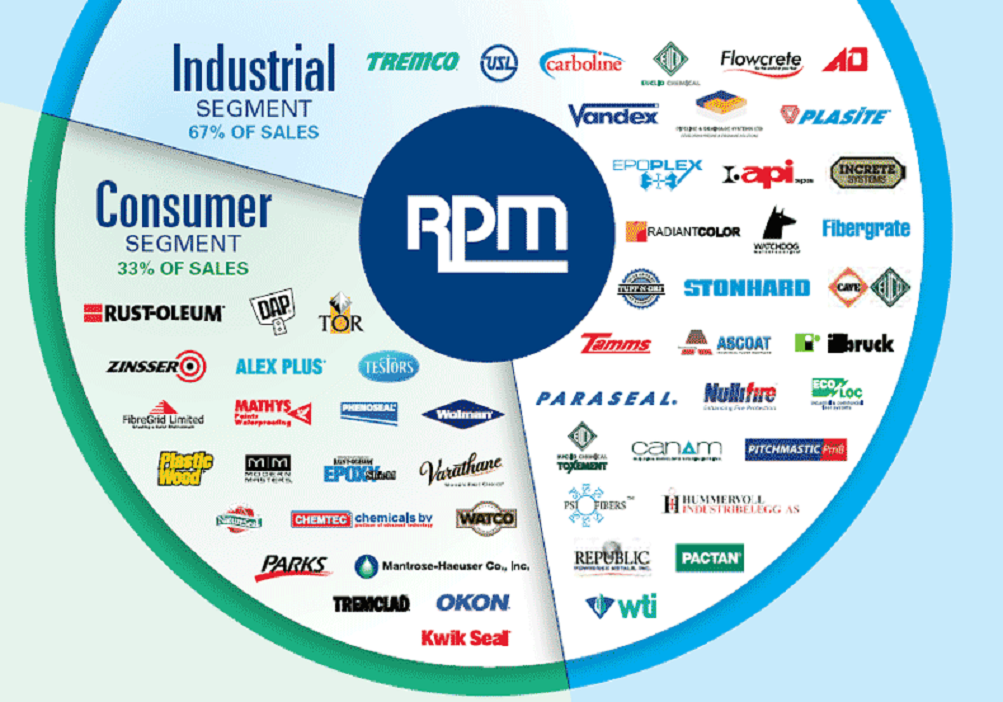Coatings and sealants are important for a wide variety of applications in the industrial and consumer sectors, and RPM International (RPM +1.73%) provides many key products to serve those purposes. Consumers will be most familiar with brands like DAP and Rust-Oleum, but RPM also produces industrial cleaners, restoration services equipment, and building materials.
Coming into Thursday's fiscal second-quarter financial report, RPM shareholders were hoping the company would be able to eke out flat to slightly higher financial results. Unfortunately, although RPM's sales were higher, earnings took a hit, and the company cut its guidance for the full 2017 fiscal year. Let's take a closer look at RPM International's latest numbers and what they say about its business going forward.

Image source: RPM International.
RPM International spills on its bottom line
RPM International's fiscal second-quarter results didn't quite live up to what most of those following the stock had hoped to see. Revenue of $1.19 billion was up 3% from the year-ago quarter, and that was slightly better than the 2% growth most investors were expecting. However, the company posted a net loss of $70.9 million, working out to $0.54 per share. Even after allowing for various one-time charges, adjusted earnings of $0.52 per share missed the consensus forecast by $0.09 per share.
Taking a closer look at RPM's financial performance, the company explained that several decisions it made had an impact on its bottom line. First, RPM had to take a $188.3 million pre-tax impairment charge related to its Kirker consumer nail enamel business, which worked out to a $0.97 per share earnings hit after tax. In addition, RPM decided to exit its Flowcrete polymer flooring business in the Middle East, and that cost the company another $12.3 million, or $0.09 per share.
Net of impairments, though, RPM's results looked more solid. Organic sales climbed nearly 4%, with acquisitions adding almost two percentage points more and helping to overcome a 2.5% headwind from currency impacts. That said, things weren't entirely ideal, with consolidated pre-tax income falling more than 10% from last year's fiscal second quarter.
Looking at RPM's segments, performance was fairly consistent with recent quarters. Industrial segment sales growth was the slowest, at just 1.6%, and adjusted pre-tax income eased downward by almost 2%. Negative conditions in the oil and gas industry continued to weigh on the segment, along with poor performance in heavy equipment. However, the specialty segment saw sales gains of almost 6%, with organic growth making up the bulk of the top-line rise. Pretax income for the specialty business was up more than 10%. The consumer segment posted a 4% sales rise, again developed nearly entirely from organic sources, and despite the one-time charges tied to the segment, RPM was able to improve market share and take advantage of stronger conditions in the housing market.
CEO Frank Sullivan was happy with how things were going. "Even in our more global economically challenged industrial segment business," Sullivan said, "we are generating solid growth in local currencies." The CEO also pointed to strength in RPM's U.S.-based businesses in the commercial construction, restoration, and consumer areas in helping to lead the company forward.
What's ahead for RPM?
RPM has high hopes for the future. In Sullivan's words, "We expect continued solid growth for those businesses serving the U.S. commercial construction markets," and RPM also believes that the second half of the fiscal year will be good for the specialty and consumer segments as well.
However, RPM did note that stronger currency headwinds will pose difficulties for the company. As a result, the company reduced its earnings guidance for the full 2017 fiscal year by $0.06 per share, with a new range of $2.62 to $2.72 per share expected. Not reflected in the new guidance are the charges RPM has already taken, as well as an anticipated one-time charge for its European business that will cost it an additional $0.05 per share.
RPM shareholders reacted negatively to the news, sending the stock down about 1.5% in pre-market trading following the announcement. In the long run, though, it looks like RPM's fundamental business prospects are solid. Once short-term factors turn more favorable, RPM will be in a better position to reap the rewards of its strategic moves.



